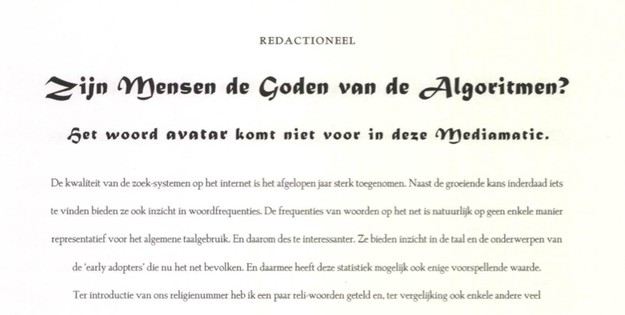The quality of Internet search systems improved greatly during last year (1995). Besides the increased chance of actually finding something, they now offer insight into the frequency of occurrence of words. Of course, word frequency on the net is in no way representative of general usage trends. This makes it all the more interesting: it offers insight into the language and areas of interest of the early adopters that now inhabit the net. This might endow such statistics with a certain prognostic value.
In introducing our religion issue, I've counted a number of religious and other frequently occurring terms, by way of comparison:
net - 11,609,022
computer - 5,759,383
science - 3,848,510
art& - 2,864,707
God& - 1,528,818
money - 1,305,716
culture - 983,871
sex - 887,068
father - 722,079
mother - 698,852
agent& - 573,768
spirit - 493,707
religion - 448,384
hell - 271,317
cyber - 264,570
demon - 240,287
heaven - 225,969
belief - 153,136
Devil - 117,238
Kirk - 114,394
Allah - 107,795
Elvis& - 100,542
avatar - 45,861
Buddha - 40,874
confession - 30,836
voodoo - 28,331
incarnation - 17,700
Jaweh - 13
The word net itself heads the list, for obvious reasons. Neither should the disproportionately high rate of occurrence of computer or science cause any surprise, given the history of the net.
It is interesting that art occurs twice as frequently as God, which only barely succeeds in topping money. It is difficult to say whether this is a sign of increasing secularisation or evidence of the cultural value of the net. Indeed, when you see that culture occurs ten percent more often than sex and twice as often as religion, you might almost believe the latter.
God easily scores highest in the category of universal persons; twice as much as either father or mother (father+mother=God). Spirit is also high on the list in this category, easily outscoring demon, devil, Elvis and Kirk. Agent scores notably high as well, almost equalling mother and father.
And we can see that cyber is firmly ensconced in between hell and heaven.
The increasingly popular avatar is a special case. The word originates from Sanskrit and literally means descent - in the Hindu religion, the descent of a god into the world of human beings, analogous to the Christian concept of incarnation. One could say that Jesus was an avatar of God.
The Hindu avatar is a great deal more multifaceted, however. A godhead can simultaneously possess a number of avatars of different kinds. Avatars remain in direct contact with their godhead and have divine characteristics and consciousness.
The god Vishnu has the greatest number of avatars, and also the best--known, including Krishna, Rama and Buddha.
However, on the net, still populated mainly by Westerners with a Judeo-Christian background, avatar occurs three times as frequently as incarnation. This is not the result of a revival of interest in Eastern religions, but rather because of Neil Stephenson, who endowed the term with a new meaning in his book Snowcrash. In Stephenson's book, an avatar is the virtual personification of a human being in the Metaverse, Stephenson's version of Cyberspace.
In the meantime, the net is full of people calling themselves Avatars, along with two MOOs, several bands and a great number of companies, ranging from Avatar NuMedia to Avatar Real Estate Development. The term is all the rage and is used without further explanation.
Most of the users don't know the word's origin and have no idea of the irony of this inversion of meaning: from god-become-flesh to human-become-virtual.
Or is there no inversion, and should we assume that cyberspace is to the earth as the earth is to heaven? Then, people are the gods of the algorithms! In the next issue of Mediamatic, the Secret Agent Issue, we take a closer look at the increasing complexity of the relationship between human beings and codes, which are authoring themselves with greater and greater frequency.
Willem Velthoven
